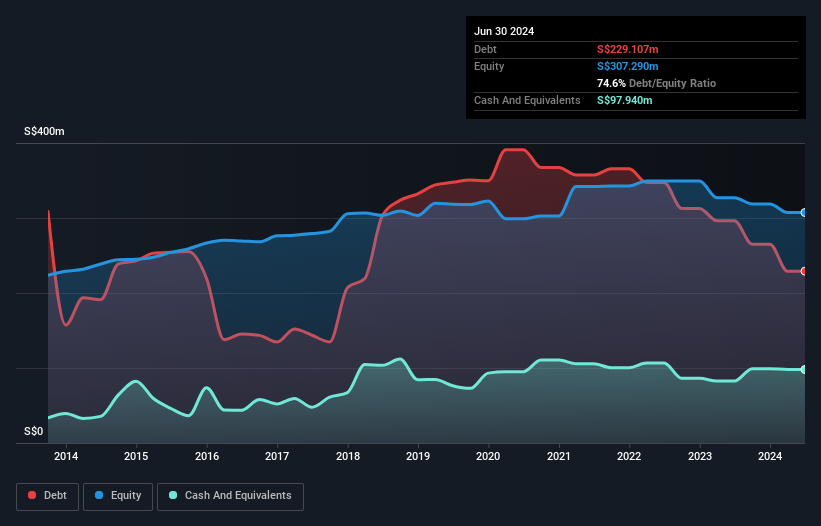- Singapore
- /
- Construction
- /
- SGX:K75
Koh Brothers Group (SGX:K75) Has Debt But No Earnings; Should You Worry?
Warren Buffett famously said, 'Volatility is far from synonymous with risk.' It's only natural to consider a company's balance sheet when you examine how risky it is, since debt is often involved when a business collapses. Importantly, Koh Brothers Group Limited (SGX:K75) does carry debt. But the more important question is: how much risk is that debt creating?
Why Does Debt Bring Risk?
Debt is a tool to help businesses grow, but if a business is incapable of paying off its lenders, then it exists at their mercy. In the worst case scenario, a company can go bankrupt if it cannot pay its creditors. However, a more common (but still painful) scenario is that it has to raise new equity capital at a low price, thus permanently diluting shareholders. Of course, plenty of companies use debt to fund growth, without any negative consequences. The first thing to do when considering how much debt a business uses is to look at its cash and debt together.
Check out our latest analysis for Koh Brothers Group
What Is Koh Brothers Group's Debt?
As you can see below, Koh Brothers Group had S$229.1m of debt at June 2024, down from S$296.4m a year prior. However, it also had S$97.9m in cash, and so its net debt is S$131.2m.

How Strong Is Koh Brothers Group's Balance Sheet?
The latest balance sheet data shows that Koh Brothers Group had liabilities of S$224.3m due within a year, and liabilities of S$120.3m falling due after that. On the other hand, it had cash of S$97.9m and S$203.3m worth of receivables due within a year. So its liabilities outweigh the sum of its cash and (near-term) receivables by S$43.4m.
This is a mountain of leverage relative to its market capitalization of S$51.6m. Should its lenders demand that it shore up the balance sheet, shareholders would likely face severe dilution. There's no doubt that we learn most about debt from the balance sheet. But it is Koh Brothers Group's earnings that will influence how the balance sheet holds up in the future. So when considering debt, it's definitely worth looking at the earnings trend. Click here for an interactive snapshot.
In the last year Koh Brothers Group had a loss before interest and tax, and actually shrunk its revenue by 30%, to S$273m. That makes us nervous, to say the least.
Caveat Emptor
Not only did Koh Brothers Group's revenue slip over the last twelve months, but it also produced negative earnings before interest and tax (EBIT). Its EBIT loss was a whopping S$8.8m. Considering that alongside the liabilities mentioned above does not give us much confidence that company should be using so much debt. Quite frankly we think the balance sheet is far from match-fit, although it could be improved with time. We would feel better if it turned its trailing twelve month loss of S$13m into a profit. So in short it's a really risky stock. There's no doubt that we learn most about debt from the balance sheet. But ultimately, every company can contain risks that exist outside of the balance sheet. Case in point: We've spotted 3 warning signs for Koh Brothers Group you should be aware of, and 1 of them is concerning.
At the end of the day, it's often better to focus on companies that are free from net debt. You can access our special list of such companies (all with a track record of profit growth). It's free.
Valuation is complex, but we're here to simplify it.
Discover if Koh Brothers Group might be undervalued or overvalued with our detailed analysis, featuring fair value estimates, potential risks, dividends, insider trades, and its financial condition.
Access Free AnalysisHave feedback on this article? Concerned about the content? Get in touch with us directly. Alternatively, email editorial-team (at) simplywallst.com.
This article by Simply Wall St is general in nature. We provide commentary based on historical data and analyst forecasts only using an unbiased methodology and our articles are not intended to be financial advice. It does not constitute a recommendation to buy or sell any stock, and does not take account of your objectives, or your financial situation. We aim to bring you long-term focused analysis driven by fundamental data. Note that our analysis may not factor in the latest price-sensitive company announcements or qualitative material. Simply Wall St has no position in any stocks mentioned.
About SGX:K75
Koh Brothers Group
An investment holding company, provides management services in Singapore, Malaysia, Indonesia, and internationally.
Excellent balance sheet and slightly overvalued.
Market Insights
Community Narratives




